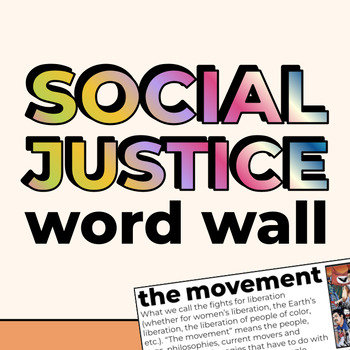Social Justice Word Wall
Westside Pedagogy
38 Followers
Grade Levels
1st - 12th, Higher Education, Adult Education, Homeschool, Staff
Subjects
Resource Type
Standards
CCSSCCRA.L.6
CCSSRH.6-8.4
CCSSRH.6-8.10
Formats Included
- Google Slides™
Westside Pedagogy
38 Followers

Made for Google Drive™
This resource can be used by students on Google Drive or Google Classroom. To access this resource, you’ll need to allow TPT to add it to your Google Drive. See our FAQ and Privacy Policy for more information.
Description
I created these materials to facilitate learning for all (teachers and their students, elders and children, or learners on personal journeys). They are free because I am trying to build outside of capitalism. If you have the means and feel the impulse, I will accept donations to my personal venmo page (@K-Tutaya).
This word wall has over 400 terms that I've used as an organizer in fights against the prison industrial complex and for the rights of trans queer migrants.
These terms come from the political consciousness development of critical resistance, Trans Queer Pueblo, as well as from my own social justice education.
A few ideas for using this product:
- Focus on the values
For some classes, I'll pull one of the values cards a week/month and ask about students' experiences with school and at home. For example, for autonomy, I'll ask "who makes the decisions about your life? What things do you wish you could decide for yourself?" Then I'll bring in maybe one other example that is connected to the concept (for autonomy, you can bring in the Zapatistas, for example) and those become journal prompts. If you would like to dialogue about ways to do this in your classroom, I welcome your messages. - Focus on learning from, with, or about the organizers
Work with only the organizer cards.
Maybe it's a research-practice activity where students are researching a person, trying to find out what their tactics were, what they stood for, or who was against them and comparing the validity, impact, value of sources. (Did the autobiography help you answer these questions better than the history book page? Why do you trust the autobiography more? What's the difference between the answers you're able to attain from biography.com and wikipedia.org? Who writes for biography and wikipedia? etc.)
Or maybe the point is to watch a recorded event of that person speaking and write a speech in their voice, but on a topic of your choosing. - Learn alongside your students w/ an Inquiry-Based project on a topic
Why not plan an inquiry-based-learning or Genius Hour project focused on political consciousness building? You can learn and present something alongside your students. Define the inquiry by researching in your city only. Or make the inquiry interview-based so students are researching and observing their own lives by talking to family members. - A study of English Morphemes or English Grammar
Absolutely use these words (say, the values) to teach constructions of words in English. The suffixes -tion, -ism, -ness, -ity, and -cy are strewn throughout this resource. These are advanced noun formations that ELLs will have to get down for academic reading, writing, and speaking. You could even research and tie in the question of language justice, and what it means to be a non-native-language speaker and what language-learners need to be well.
Total Pages
Answer Key
N/A
Teaching Duration
N/A
Report this resource to TPT
Reported resources will be reviewed by our team. Report this resource to let us know if this resource violates TPT’s content guidelines.
Standards
to see state-specific standards (only available in the US).
CCSSCCRA.L.6
Acquire and use accurately a range of general academic and domain-specific words and phrases sufficient for reading, writing, speaking, and listening at the college and career readiness level; demonstrate independence in gathering vocabulary knowledge when encountering an unknown term important to comprehension or expression.
CCSSRH.6-8.4
Determine the meaning of words and phrases as they are used in a text, including vocabulary specific to domains related to history/social studies.
CCSSRH.6-8.10
By the end of grade 8, read and comprehend history/social studies texts in the grades 6–8 text complexity band independently and proficiently.





